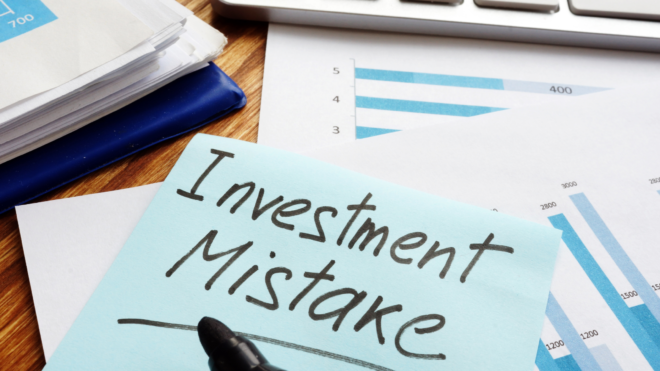Investing for retirement can be a complex and daunting task, particularly for individuals with substantial assets. The more wealth you have to manage, the higher the stakes, and the potential for mistakes increases. However, with the right strategy and awareness, many investment pitfalls can be avoided.
In this article, we’ll discuss common mistakes that investors often make and provide general insights on how to avoid them. Whether you’re early in your financial journey or already preparing for retirement, these tips can help you protect and grow your hard-earned wealth.
Always remember to consult with a financial professional before making any major financial decisions.
1. Failing to Diversify Adequately
Diversification is one of the foundational principles of investing, yet many investors concentrate their wealth in a few asset classes or even a single stock. Without proper diversification, your portfolio can become overly exposed to certain risks, as many experienced during the 2008 financial crisis when real estate prices collapsed.
How to Consider Approaching Diversification:
- Asset Class Diversification: Consider balancing your investments across various asset classes.
- Geographic Diversification: Consider diversifying between domestic and international markets.
- Sector Diversification: Consider spreading your stock investments across different sectors to avoid over-concentration in one industry.
A well-diversified portfolio can help protect against significant losses, and consulting a financial professional can help ensure your risk is appropriately managed.
2. Failing to Adjust Risk as Retirement Approaches
One of the biggest mistakes investors make is failing to reduce portfolio risk as they near retirement. A high-risk portfolio may deliver greater returns when you’re younger, but it can leave your assets vulnerable to market downturns at a time when you may need stability.
Consider These Strategies to Help Adjust Risk:
- As retirement approaches, gradually shift a portion of your portfolio to more conservative investments like bonds or dividend-paying stocks.
- Consider adding investments that offer more predictable income, such as annuities, to provide a stable financial base in retirement.
A financial advisor can help you assess your risk tolerance and recommend adjustments as you get closer to your retirement date.
3. Overlooking Tax Efficiency in Investments
Without proper tax planning, high-net-worth individuals may face significant tax liabilities, potentially eroding investment returns. Many investors fail to utilize tax-advantaged accounts or make tax-efficient investment choices.
Strategies to Consider to Help Manage Tax Efficiency:
- Tax-Advantaged Accounts: Consider maximizing contributions to retirement accounts like IRAs and 401(k)s, where your investments can grow tax-deferred or tax-free.
- Tax-Loss Harvesting: Consider offsetting gains by selling underperforming assets to help reduce your taxable income.
- Tax-Efficient Investments: Consider choosing tax-efficient investments, such as ETFs or index funds, that help minimize capital gains distributions.
Consulting a financial professional can be essential for personalized strategies for tax-efficient investing.
4. Emotional Decision-Making
Market volatility can trigger emotional responses in investors, leading to poor decision-making. Common emotional mistakes include panic-selling during market dips or chasing hot investments when prices are high.
How to Control Emotions in Investing:
- Stick to a well-thought-out financial plan and avoid making impulsive decisions based on short-term market fluctuations.
- Consider working with a financial professional to keep you focused on long-term goals and prevent emotional reactions from derailing your strategy.
An investment strategy based on sound financial principles rather than emotions can help you stay on track toward your retirement goals.
5. Not Accounting for Inflation
Many investors underestimate the long-term impact of inflation, especially in retirement planning. Over time, inflation erodes purchasing power, making it essential to invest in assets that can outpace inflation.
How to Mitigate Inflation Risk:
- Consider investing in stocks, which historically have outpaced inflation over the long term.
- Explore inflation-protected securities like Treasury Inflation-Protected Securities (TIPS) to help safeguard a portion of your portfolio.
Ensure that your retirement plan accounts for inflation to help your savings maintain their value over time.
6. Underestimating Longevity Risk
People are living longer than ever, and it’s easy to underestimate how long retirement might last. Outliving your savings can be a serious concern, particularly if your financial plan doesn’t account for a potentially lengthy retirement.
How to Address Longevity Risk:
- Consider structuring your portfolio to provide a sustainable income stream that can last for 20–30 years or more.
- Certain annuities may help ensure that you don’t run out of money, even if you live longer than expected.
A financial advisor can help create a retirement income plan that addresses the risk of outliving your savings.
7. Ignoring Estate Planning
Estate planning helps ensure your wealth is transferred according to your wishes while minimizing estate taxes. Failing to establish a plan can result in unnecessary taxes and probate delays, potentially complicating the transfer of your assets to loved ones.
Estate Planning Considerations:
- Creating a Will: A will help ensure that your assets are distributed as you intend. Without one, state laws may dictate how your property is divided.
- Establishing Trusts: Trusts can help manage and transfer wealth while minimizing taxes and avoiding probate.
Consult with an estate planning professional to help make sure your legacy is preserved.
8. Not Rebalancing Your Portfolio Regularly
Portfolio rebalancing is essential to maintaining your desired risk level. Market fluctuations can cause your asset allocation to drift, which may expose you to unintended risk.
How to Rebalance Your Portfolio:
- Regularly review and rebalance your investments to help ensure they align with your original target allocation. This often involves selling some of your winners and reinvesting in underperforming asset classes to maintain balance.
Working with a financial advisor can help ensure your portfolio stays aligned with your long-term goals.
How CKS Summit Group Can Help
Avoiding common investment mistakes is essential to protecting your wealth and helping secure a comfortable retirement. Navigating the complexities of portfolio management, tax efficiency, risk adjustment, and estate planning can be overwhelming, particularly as you approach retirement. At CKS Summit Group, we’re experienced in providing personalized financial education designed to help you avoid these pitfalls and achieve your retirement goals.
Our team of financial advisors works with you to create a customized plan that accounts for your unique needs, risk tolerance, and long-term goals. Whether you need help with investment diversification, tax planning, or helping to ensure that your portfolio aligns with your retirement timeline, we are here to guide you every step of the way.
Let us help you make informed decisions and avoid the costly mistakes that could jeopardize your financial future. Contact CKS Summit Group today to begin building a secure, prosperous retirement.
FAQs
1. When should I start adjusting the risk in my portfolio for retirement? It’s generally advisable to begin reducing risk in your portfolio 5 to 10 years before retirement. This transition helps ensure that your assets are less exposed to market volatility as you approach the time when you will need to start withdrawing funds.
2. How can I help ensure my investments are tax-efficient? Tax-efficient investing involves utilizing tax-advantaged accounts like IRAs or 401(k)s, investing in tax-efficient securities, and taking advantage of strategies like tax-loss harvesting. A financial professional can help you optimize your investments for tax efficiency based on your specific circumstances.
3. What is the best way to diversify my investment portfolio? Diversification involves spreading your investments across various asset classes (stocks, bonds, real estate), sectors (technology, healthcare), and geographical regions (domestic and international markets). A well-diversified portfolio helps reduce exposure to risk and can improve long-term returns.
4. How can I help protect my retirement savings from inflation? Investing in assets like stocks, real estate, and Treasury Inflation-Protected Securities (TIPS) can help protect your retirement savings from inflation. It’s important to regularly review your portfolio with a financial advisor to help ensure it stays aligned with inflationary trends.
5. Why should I work with a financial advisor as I approach retirement? A financial advisor can provide valuable insights into managing risks, optimizing tax strategies, adjusting your portfolio for retirement, and helping ensure your savings last throughout your lifetime. They can help you avoid common investment mistakes and provide personalized advice that aligns with your goals.
Disclaimer: This article is for informational purposes only and should not be considered financial or investment advice. Always consult with a financial advisor before making any investment decisions. CKS Summit Group does not offer personalized investment advisory services.



